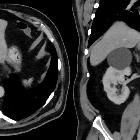esophageal fibrovascular polyp










Esophageal fibrovascular polyps are benign intraluminal submucosal pedunculated tumors that can grow significantly and cause dysphagia symptoms. They usually occur in the upper third of the oesophagus, at the level of the upper esophageal sphincter.
Terminology
They were previously denominated esophageal lipomas, fibromas, or fibrolipomatous polyps of the esophagus, but all these terms have been replaced accordingly to the World Health Organization classification system .
Clinical presentation
Symptoms are related to the size of a tumor with dysphagia being the most common complaint. Respiratory symptoms are also frequent and cases of tumors with long stalk being regurgitated into the pharynx have been described as a cause of death from asphyxiation .
Radiographic features
Plain radiograph
It can occasionally be identified as a right-sided superior mediastinal mass with associated anterior tracheal bowing.
Fluoroscopy
Proximal esophagus intraluminal, sausage-shaped filling defect mass with smooth contours extending inferiorly into the thoracic esophagus.
CT
Well-defined solid mass expanding the lumen of the proximal esophagus. Fat-attenuated components may be present in lesions with abundant adipose tissue .
Differential diagnosis
Siehe auch:
- Leiomyom Ösophagus
- benigne Ösophagustumoren
- Tumoren des Ösophagus
- Granularzelltumor des Ösophagus
- Lipome des Ösophagus
- Leiomyomatose des Ösophagus
- Fibrovaskulärer Polyp
- Hämangiom des Ösophagus
- giant fibrovascular polyp of the oropharynx
- inflammatory fibroid polyp of the oesophagus
- Fibrovaskulärer Polyp des Hypopharynx
- papilloma of the esophagus
und weiter:

 Assoziationen und Differentialdiagnosen zu Fibrovaskulärer Polyp des Ösophagus:
Assoziationen und Differentialdiagnosen zu Fibrovaskulärer Polyp des Ösophagus:






